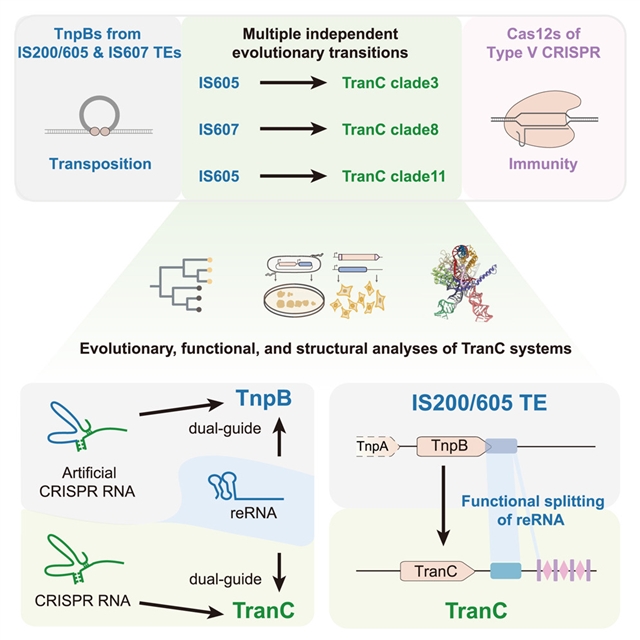
中国科学院遗传与发育生物学研究所高彩霞课题组取得一项新突破。他们的研究发现功能性RNA分裂推动了转座子V型CRISPR-Cas系统的进化出现。这一研究成果发表在2025年9月29日出版的国际学术期刊《细胞》上。
该研究组鉴定了来自不同IS605-或IS607-TnpB谱系的TranCs(转座子crispr中间产物)。TranCs利用CRISPR RNAs和RNAs来指导DNA切割。Lawsonibacter sp. LaTranC的低温电镜结构。与ISDra2 TnpB复合体非常相似;然而,与单分子RNA不同,lanranc引导RNA在功能上分为tracrRNA和crRNA。ISDra2 TnpB的工程RNA分裂使其具有CRISPR阵列的活性。这些发现表明,功能性RNA分裂是驱动转座子出现多种V型CRISPR-Cas系统的主要分子事件。
据了解,转座子编码的TnpB核酸酶通过多个独立的驯化事件产生V型CRISPR-Cas12效应物。这些系统将不同的RNA分子作为DNA靶向的指南:转座子衍生的右端RNA (RNAs或omega RNA)用于TnpB, CRISPR RNA用于V型CRISPR-Cas系统。然而,连接转座子活性和CRISPR免疫的分子机制尚不清楚。
附:英文原文
Title: Functional RNA splitting drove the evolutionary emergence of type V CRISPR-Cas systems from transposons
Author: Shuai Jin, Zixu Zhu, Yunjia Li, Shouyue Zhang, Yijing Liu, Danyuan Li, Yuanqing Li, Yingfeng Luo, Zhiheng Cheng, Kevin Tianmeng Zhao, Qiang Gao, Guanglei Yang, Hongchao Li, Ronghong Liang, Rui Zhang, Jin-Long Qiu, Yong E. Zhang, Jun-Jie Gogo Liu, Caixia Gao
Issue&Volume: 2025-09-29
Abstract: Transposon-encoded TnpB nucleases gave rise to type V CRISPR-Cas12 effectors through multiple independent domestication events. These systems use different RNA molecules as guides for DNA targeting: transposon-derived right-end RNAs (reRNAs or omega RNAs) for TnpB and CRISPR RNAs for type V CRISPR-Cas systems. However, the molecular mechanisms bridging transposon activity and CRISPR immunity remain unclear. We identify TranCs (transposon-CRISPR intermediates) derived from distinct IS605- or IS607-TnpB lineages. TranCs utilize both CRISPR RNAs and reRNAs to direct DNA cleavage. The cryoelectron microscopy (cryo-EM) structure of LaTranC from Lawsonibacter sp. closely resembles that of the ISDra2 TnpB complex; however, unlike a single-molecule reRNA, the LaTranC guide RNA is functionally split into a tracrRNA and crRNA. An engineered RNA split of ISDra2 TnpB enabled activity with a CRISPR array. These findings indicate that functional RNA splitting was the primary molecular event driving the emergence of diverse type V CRISPR-Cas systems from transposons.
DOI: 10.1016/j.cell.2025.09.004
Source: https://www.cell.com/cell/abstract/S0092-8674(25)01035-9
